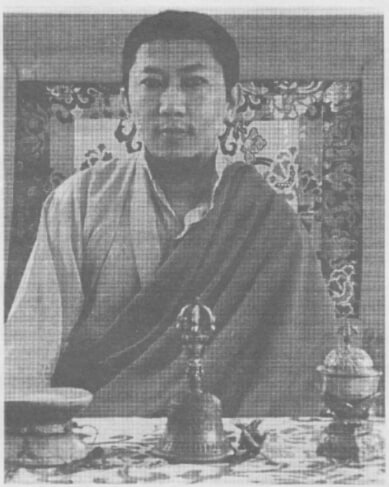| The following article is from the Winter, 1999 issue of the Snow Lion Newsletter and is for historical reference only. You can see this in context of the original newsletter here. |
The Venerable Shyalpa Rinpoche
From an interview with The Venerable Shyalpa Rinpoche by Ed Treitler of New Visions, in the Berkshires of Massachusetts, spring 1998.

The Venerable Shyalpa Rinpoche is a Tibetan Lama and teacher in the Nyingma and Kagyu lineages of Tibetan Buddhism. Rinpoche studied and practiced under venerable teachers from the four major Tibetan Buddhist lineages, and Rinpoche considers His Holiness Chatral Rinpoche, the greatest living Dzogchen master, as his kind root teacher. In 1989, Rinpoche founded Rangrig Yeshe Center, a non-profit organization located in the Berkshires, that is devoted to the study and practice of Tibetan Buddhism. In the same year, at the request of many Tibetans, Rinpoche founded The Tibetan Refugee Children's Fund, a project operated under the auspices of Rangrig Yeshe and staffed entirely by volunteers, which finds sponsors for needy Tibetan refugee children living in India and Nepal. Since 1995, Shyalpa Monastery and Retreat Center has been imder constniction in Nepal, on Kopan Hill overlooking Boudha and the Kathmandu Valley.
NV: How do you offer the teachings of Buddha?
Rinpoche: Those who come to receive teachings will be people who are interested in looking into themselves. In these teachings, we always look to ourselves to see what we can improve and what we can see in ourselves that is beautiful. We start looking at ourselves and helping ourselves by knowing there is a potential and by the intention to generate compassion for all sentient beings, since we all know that everyone, in one way or another, is suffering. By recognizing everyone's vulnerability, including our own, we honestly try to relate to ourselves and to others. By generating compassion to all beings, there is a possibility to free ourselves of suffering. By looking into ourselves, we try to see what is the cause of our suffering. Compassion is the force behind all these activities.
NV: There are other aspects of Buddhist teaching. Some of them seem quite difficult for a Westerner. Are many people prepared to go far into this teaching?
Rinpoche: In a sense everyone is prepared for it, because no one wants to suffer. The solution to suffering is there, in the Buddhist teaching. Being able to recognize there is a solution is, in itself, a very profound thing. That realization alone makes you a practitioner. Compassion allows us to see things more clearly, things we would not see because of our own selfishness.
This selfishness, from a Buddhist point of view, is not always constant. We could be more free from it by doing meditation practices. We could become the Buddha. It is important to believe that whatever selfishness or negativity we have, if we practice, we can go beyond it. We are not inherently wrong; there is a basic goodness within all of us, an enlightened nature. If you do not believe in basic goodness I do not know how you can be complete.
NV: I see you talk about wisdom in everyday life in your forthcoming teachings. How do you relate your teachings to everyday life?
Rinpoche: Generating compassion gives us more space. For instance, if somebody is angry at you, if you do not respond to the anger right away, you can bring this compassion out of you. You will not respond negatively; you have a chance to see why this person is angry. Is something obscuring their vision? Or is it something I have done wrong? Basically, you are given a chance to see the other person as a legitimate and dignified being who deserves all your attention. And then you also know that you, yourself, deserve the same. That gives us both a chance to communicate. Our base is the basic goodness. We are radiating out from that base.
NV: Do you consider the goal of enlightenment important?
Rinpoche: The goal of enlightenment is important if the goal is to help all beings. It is good to have a goal. If ultimately your interest is in benefiting others, whatever is negative about having a goal will disappear naturally.

When your compassion is a hundred percent complete, another word for it is Buddha. That means being able to live our life fully, completely.
NV: It seems that many people use enlightenment for theynselves.
Rinpoche: But why? That is not enlightenment. That is conceptual enlightenment. Real enlightenment cannot be conceptualized or achieved by thinking. Nothing is more meaningful than being able to share with others.
NV: What is self-liberation?
Rinpoche: Self-liberation is to realize our already liberated quality. Through meditation and other techniques, if you approach this in a complete way, you do not have to try to make yourself an enlightened person. Rather, you bring out that enlightenment which is in all of us. Self-liberation is already liberated. Through compassion, love, caring and wisdom, we will be able to free ourselves from obscurations such as anger, dualistic perception, fear, hope and selfishness.
NV: How important is meditation in Buddhism?
Rinpoche: Meditation is very important. hi this path if you do not meditate there's no accomplishment. But of course, meditation can be defined in many ways. It does not mean just breathing; the meaning can go farther. Ultimately, there can be meditation where you do not have the sense of meditating, but then there is also no sense of distraction. Completely free from distraction is ultimate meditation.
NV: But how can we be free from suffering and grasping?
Rinpoche: From the beginning, it is important to realize the preciousness of human life. For example, if a bee gets lost sucking the juice of a flower and night comes and the petals close, the bee dies. If, on the other hand, the bee takes advantage of the juice and flies away, the flower will close and open again the next day. This example enables us to see the importance of living our life free of consequences. If we are grasping, then we experience those consequences. Grasping makes us pay a price.
Then comes the teaching on the impermanence of life. It's not enough to realize the preciousness of human life alone; we must be aware of the impermanence of our life. The teaching on impermanence inspires us to practice ceaselessly, which enables us to live our life completely now.
The teaching on cause and effect follows. For instance, if you are negative to people you will experience negativity. If you are compassionate you will experience the samelight and joy from people.
Whatever we dotouch, feel, sensewe need not do in the ordinary way. What I mean by the ordinary way is our habituated way of attachment to the senses. We are not mindful of the consequences. That is the cause of suffering, or samsara.
But Buddha never said those senses are bad. The essence of all these things is bliss. It's up to you to be totally sensitive, understanding, compassionate, to use all the wisdom and skills and sense, but not to be habituated or consumed by the senses.
Buddha's teaching shows us how we can free ourselves in a most profound way. When one is not able to actualize genuine interpretation of the Buddha's teachings, then one becomes a spiritual materialist, sidetracked. That's the danger.
NV: Tell us about your Center in the Berkshires.
Rinpoche: Since coming to the Berkshires ten years ago, my students have requested that I establish a center where they can support my activities and benefit themselves and others interested in Buddhist teachings. This center provides a chance for members to do long retreats and meditation. We also have organized a children's fund for refugees from Tibet in India and Nepal. We have so far sponsored around three hundred children who go to school. Very simple things. Our focus is being able to help whoever we touch.
NV: So your path is the path of kindness towards others?
Rinpoche: When your compassion is a hundred percent complete, another word for it is Buddha. That means being able to live our life fully, completely. Buddhist teaching is very realistic, it is very democratic. We want to give total importance to every individual, in every situation. In a sense, the teaching is with us all the time; we only have to apply it. This teaching is not something we practice for a later time; it is for living in the here and now.
For more information about the Centers, The Venerable Shyalpa Rinpoche's spring/summer teaching schedule and information about sponsoring a Tibetan refugee child, contact Rangrig Yeshe Center, P.O. Box 1167, Stockbridge, Mass. 01262, 413-528-9932, fax 413-528-5272, or e-mail: [email protected]. All donations toward the children are fully tax-deductible. Every penny you send goes to the children directly, and sponsors may have direct correspondence with the children in the refugee camps.

